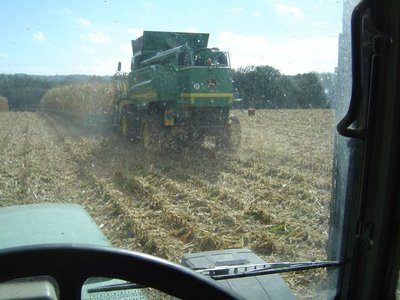
Technology! I ended my last post by saying that I had a computer problem and would be offline for a while. Thanks to our friend Caroline, who had lent us a spare screen, we’re up and running again, at least for the time being; but it is a reminder of how reliant we are on technology and how life seems to grind to a halt if something fails! How did we ever cope without emails and the ability to access the Internet?
In exchange for some wheat for our poultry and diesel for our very small and very old tractor, I’d been asked to help out Paul, our pig-farming neighbour, with his corn harvest. By virtue of a heavy goods vehicle and coach entitlement, I’ve got a licence to drive a tractor but, before yesterday, I’d never driven one. Inside every man, is there not a little boy who always wanted to drive a tractor? Certainly inside this man! After the all-too-brief instructions, or lack of them, and in French as well (basically: “follow the combine and, when you’re full, go and empty the trailer over there”) I fulfilled my boyhood dream and drove a huge green tractor for two days and 29 hectares of cornfield.
Permaculture? No, not really but it was fascinating to see, and thereby understand, the scale of modern food production. There were five of us working: me driving the two tractors—reversing a full trailer onto the hopper and leaving someone else to unload it whilst I jumped into the other and drove back to meet the combine on the field—and the others piling the shredded-into-flour corn into a huge heap to be covered with a polythene tarpaulin. I’m not sure I could put into words the scale of it all, and I certainly couldn’t answer the question “is permaculture a real and viable alternative to modern industrial farming methods?” Another question I can’t answer is how, economically, modern farming and food production works. From our own observations here, the farmers work extremely hard, often without taking holidays for years on end, for slim rewards, and receive about 30% of their income from EU subsidies, without which, they couldn’t operate. Why? The food at the supermarkets gets cheaper and cheaper because, with their power of purchase, they are able to force down prices and squeeze the supplier, so the government has to subsidise the farmers, who would otherwise go out of business. We must be paying more taxes (to subsidise farmers) for the privilege of buying cheaper food. It’d be great to hear your views, so please post a comment.
